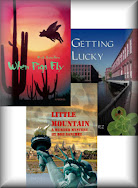Today I am happy to host Allen Woods, a writer and historian who has written the novel The Sword & Scabbard: Thieves and Thugs and the Bloody Massacre in Boston. Apparently, many colonists were not as well behaved as our Founding Fathers! Please feel free to ask him questions and comments.
Crude vengeance, angry mobs
 |
| Author Allen Woods |
 One of the reasons I
find history so fascinating is that there is so much to learn compared to what
many of us learned in school. As George Orwell pointed out in 1944, history is
written by the winners. In general, the winners have a narrative they’d like to
convey whether it strictly matches the facts or not.
One of the reasons I
find history so fascinating is that there is so much to learn compared to what
many of us learned in school. As George Orwell pointed out in 1944, history is
written by the winners. In general, the winners have a narrative they’d like to
convey whether it strictly matches the facts or not.
Most of us have ingested
a view of Revolutionary times that involves noble speeches and actions, and a
unified pursuit of democratic ideals (this is true of most other periods of
American history as well). There were certainly instances of noble thoughts and
deeds during the period, but there was a lot more going on as well. My research
brought to mind the modern cliché about politics and making sausage: you might
like the product, but the process is rather unsavory.
In doing research for
some American history textbooks, I began to think about some of the realities
that were suggested but not emphasized, such as the practice of tarring and
feathering British officials or their supporters. It all sounds rather jolly
until you imagine a man stripped of his clothes, cowering before an angry mob,
painted with boiling tar from the docks, covered in foul poultry feathers and
dragged about town to the delight of jeering crowds. According to one
historical account, removing the tar took off layers of skin as thick as
steaks. Suddenly, Revolutionary ideals seem a long way off.
The same was true of the
protests against the Stamp Act in Boston. Anyone willing to sell the tax stamps
or support those who did risked the crude vengeance of a rough and angry mob
directed by leaders who stayed in the background and often hypocritically
deplored the violence in public. It was common for a British Customs family to
have their house surrounded and windows broken out as a mob howled threats, for
businesses to have their doors painted with urine and feces during the night,
for officials to be accosted in the street, knocked down and dragged through gutters
filled with sewage.
 |
| An early depiction of the Boston Massacre |
Of course, the British soldiers
responded in kind once they were ordered to occupy Boston to maintain order in
1768. There were constant scuffles and brawls in the streets between angry
British soldiers who were paid a pittance and forced to live in harsh
conditions and dockworkers and sailors out of work because of the British
occupation. It was this physical violence, especially the threats to the
British upper class and their property, that propelled England and America down
the path toward a formal war more than any of the speeches or writings by
American leaders.
Another issue suggested
by my research and that inspired my book was the intersection between politics
and crime. Smuggling was common in American ports before the war and was the
foundation of John Hancock’s fortune and that of some other large merchants. At
some point, it dawned on me that when John Hancock’s ships filled with taxable
wine were unloaded beneath the noses of British Customs officials, it wasn’t
Hancock unloading the hundred-gallon barrels in the middle of the night and
transporting them to be hidden nearby. He, or those working with him, needed a
connection with people willing to work in the night and able to evade capture
by heavy-handed officials. Later, when a rival British newspaper had its office
wrecked and equipment vandalized, American leaders needed people skilled in
criminal activities to do the deeds.
I used factual accounts
of many criminal incidents and political actions in my book to illuminate the
times from the ‘street level’ rather than present the flowery writings and
speeches that dominate much of the common historical narrative. My intent in
this book, and those will follow, is not to tear down the heroes of the time,
but simply to provide a more accurate picture. Just as the mythology surrounding
the personal life of Franklin Roosevelt, John Kennedy and Richard Nixon have
been fleshed out with more realistic and unflattering detail, careful attention
will allow us to understand the Revolutionary period better as well. From my
point of view, an honest portrayal of a fallible hero is better than any
mythical, sanitized one.
Allen
Woods has been a full-time freelance writer and editor for almost 30 years,
recently specializing in social studies and reading textbooks for all ages. The
inspiration for The Sword &
Scabbard came while doing research for an American history text. He
resides in Massachusetts and has been married to his wife, Irene, for over 30
years.


























